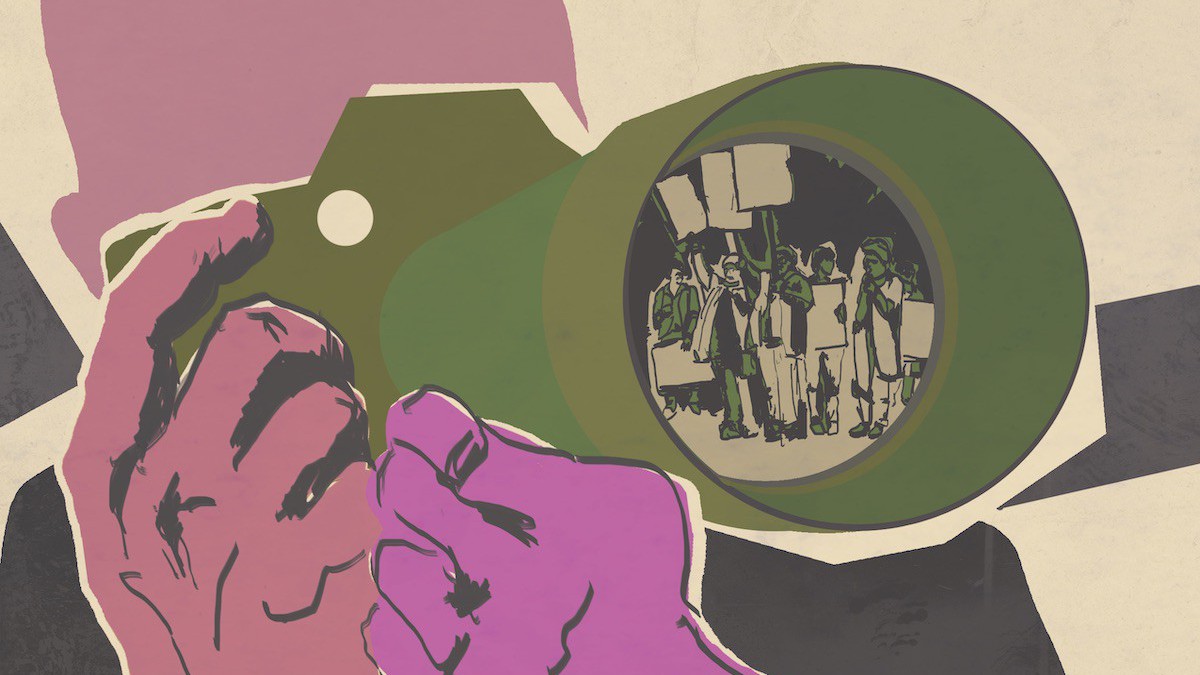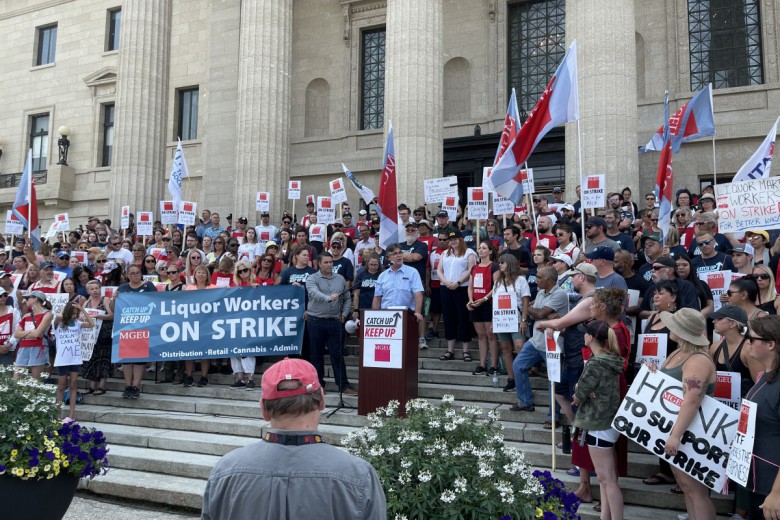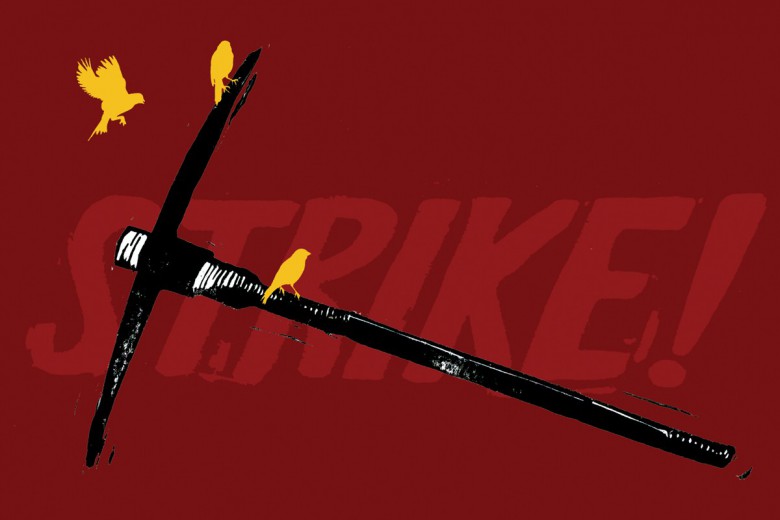When Molson Coors locked out its 300 Toronto workers on February 20, 2021, AFIMAC, the private security firm that bills itself as “the largest and most dominant player in the Canadian labour dispute marketplace,” was quickly deployed.
In mailed letters, Molson Coors’ management had previously made it clear to workers that in case of a lockout, “[t]he company has made alternate arrangements to ensure products get to our Customers.” For six weeks, the workers remained locked out and the brewery remained open – AFIMAC helped make sure of it.
“We are familiar with AFIMAC and their services. [Molson Coors] procuring their services immediately following the rejection vote is a clear indication the company had no interest in negotiating a fair and decent contract for our members,” Canadian Union of Brewery and General Workers Local 325 spokesperson Julio Montero said. “Once again confirming this was a take-it-or-leave-it offer, but clearly indicated ‘if you leave it’ what would happen.”
"[Molson Coors] procuring [AFIMAC's] services immediately following the rejection vote is a clear indication the company had no interest in negotiating a fair and decent contract for our members.”
Throughout the past year, the Milton, Ontario-based AFIMAC has warned its extensive employer Rolodex to expect rising labour unrest – and it’s been on hand to help those employers lock out their workers and break strikes with surveillance, injunctions, and scab labour.
Social media monitoring, picket line security, and scab labour provision
In November AFIMAC hosted a roundtable of management-side lawyers, anti-union consultants, and AFIMAC representatives, titled “How COVID Has Impacted the Workplace.”
“Be ready for a major fight with the unions,” management consultant John Platz warned. The present COVID-19 health crisis, he argued, will push employers to demand cuts from workers, which will be met with a pushback from union membership.
AFIMAC senior vice-president of operations vice-president Jim Rovers reiterated this warning. “I agree, the pushback to these changes will be significant,” he said. “In Alberta they had 11,000 health-care workers walk off the job earlier this week. And certainly in the monitoring that we do on our end – in intelligence gathering – there’s been some talk of ‘we need a general strike in Alberta’ and things of that nature,” Rovers said. “On my end,” he further warned, “I see the UFCW [United Food and Commercial Workers] has certainly gotten very aggressive lately.”
Social media monitoring, to keep track of union organizing and union efforts, is one of the services AFIMAC offers employers, alongside “union intel briefs,” “audits,” and “logistical support.”
Brock University labour studies professor Larry Savage tells Briarpatch, “Surveillance is a common management practice during strikes, lockouts, and even union certification campaigns. While ostensibly justified as a security measure, its primary purpose is usually to intimidate the workforce.”
AFIMAC also offers “picket line and strike security.” The latter includes helping management and other personnel to cross picket lines. In a 2011 webinar titled “Precautions for Crossing a Picket Line,” Rovers stresses: “Remember, pickets [sic] have the legal right to demonstrate. It does not provide you with the opportunity to use your vehicle as a weapon.”
“Surveillance is a common management practice during strikes, lockouts, and even union certification campaigns. While ostensibly justified as a security measure, its primary purpose is usually to intimidate the workforce.”
The company’s services are often sold as a package deal, as Rovers explains in another promo video: “What’s important, overall, is understanding what needs to be gained at the bargaining table. We have worked with organizations in the past that were seeking significant concessions and they needed to operate the facility in order to satisfy their customer needs. The cost was quite high but at the end of the day they were able to gain significant concessions which dramatically offset the cost of any security or transportation or replacement worker needs that they had.”
AFIMAC’s picket-line services also can include directly providing and transporting scab labour. The company’s website lists a number of “temporary labour” job postings – warehouse workers, personal support workers, millwrights, general labourers, forklift operators, and more.
Pricey deployments against workers
AFIMAC has long been known to use its extensive resources to help management weaken and break strikes by workers in both the public and private sectors.
In 2020, AFIMAC was contracted to bring in scabs from out of town to replace locked-out CUPE Local 508 outside workers in Fredericton. Outside workers maintain roads, water and sewage systems, and parks and trees.
Back in December 2019, Unifor Local 594 members at Federated Co-operatives Ltd. (FCL) in Regina were locked out after rejecting the company’s pension clawbacks. Scabs were deployed soon after, with the support of AFIMAC. “My understanding is everything inside the plant was AFIMAC,” then-local president Kevin Bittman tells Briarpatch. “We had evidence of AFIMAC surveillance on every picket line; they were monitoring inside the plant, everything going on outside the plant. It was a big operation. We told all our members on the line, ‘Talk like you are being heard because they’re listening to everything that’s going on.’”
Bittman notes that he was informed by company representatives the security contracted by FCL also worked to transport scabs and management into refineries via rail. “In our arbitration for our members that got terminated, they [management] were talking about how they were moving personnel in on the rail lines in rail cars,” he says.
"We told all our members on the line, ‘Talk like you are being heard because they’re listening to everything that’s going on.’”
A spokesperson for FCL told local media in January 2020 that it had established a business continuity plan months in advance to allow management and scabs to replace locked-out workers, without shortages. “Our management team that is running the facility right now have spent the last years really perfecting this plan,” the company spokesperson said.
Also in 2019, the St. Catherines Standard reported that the Canadian Niagara Hotels management behind the bitter Rainforest Cafe strike – in which scabs were used against workers fighting tip clawbacks and anti-union reprisals – retained AFIMAC’s predecessor, AFI International. Its website featured a quote from Canadian Niagara Hotels’ then-regional HR manager saying, “Your rapid response time – same day deployment – was the determining factor in minimizing the labour disruption.”
In 2018, Unifor members at a Compass Minerals salt mine in Goderich, Ontario, barricaded the mine entrance in protest of 12-hour shifts. AFIMAC was also on hand to assist management and the company’s “contract mining team” of scabs via Sea-Doo. Rovers is heard in an AFIMAC promotional video titled “What To Do When the Union Ignores a Court Injunction,” saying, “You have a management team, you have a contract mining team that’s helping out on site; you also have security as well as a host of other vendors that could not get on or off the site during that period. So, although we were using Sea-Doos to bring in a small amount of water, food, fuel, we were essentially blockaded in and had very restrictive access to maintain on site.”
In 2015, AFIMAC was deployed by Halifax Water to ensure scab workers carried on municipal water work – at a cost of nearly $2 million. As CBC News reports, “The bulk of the money spent in the first month, $724,092.00, went to wages followed by $81,240.00 for security vehicles. Lodging for the security team of about 60 people a day cost $65,667.60. $32,515.00 was spent on meals for a total of $996,054.06.” Thousands were also spent on video cards for surveillance purposes.
In 2014, the McGill Daily reported that AFIMAC was hired to monitor locked-out academics and librarians at the University of New Brunswick.
And in 2013, AFIMAC was reportedly hired by brewing company Labatt to monitor strikers in St. John’s. Regarding AFIMAC, Newfoundland and Labrador Association of Public and Private Employees employment relations officer Chris Henley told Rabble, “They’re following our members around the city. Trying to provoke argument, continuously. Trying to goad our members into violating the court injunction.... Consistently in their faces, filming them. The police come and talk to workers, they’ll try to get the names of the workers and even the police officers. But it’s all from the perspective of intimidation.”
“They’re following our members around the city. Trying to provoke argument, continuously. Trying to goad our members into violating the court injunction.... Consistently in their faces, filming them."
In 2009, the City of Windsor paid the company’s “labour dispute” security guards $57,960 per week to handle a bitter municipal strike.
In 2005, the Tyee reported that Telus management hired AFIMAC’s predecessor to ensure picketers abided by injunction rules, while the company employed scabs. During this strike, the union representing Telus workers alleged that company security assaulted two picketers.
In 2001, the company was reportedly hired to surveil McMaster University Staff Association members – videotaping them and monitoring entrances during a dispute.
In 2000, workers at Falconbridge in Sudbury, Ontario, reported that they were sprayed by gravel when they approached one of AFIMAC’s predecessor’s security vehicles. The mine owner had employed the security company to monitor their picket line and secure a court injunction. The security company was picketed by Canadian Auto Workers union members soon after.
In April 1996 – when the Metro Days of Action protest movement against then-premier Mike Harris’ neoliberal policies came to Cambridge, Ontario – AFIMAC’s predecessor was tapped to ensure auto-parts manufacturer A.G. Simpson Co. Ltd remained operational while its unionized employees were on strike. According to the Globe and Mail, in the face of a peaceful march by union members, the company deployed 109 security guards and scabs, 27 video cameras, and 45 digital radios feeding to a “command centre” in a nearby hotel. Six guards were stationed on the roof and another 22 monitored from a nearby strip mall.
Finally, in 1991, the company made some of its first headlines after Canadian Union of Postal Workers president Jean-Claude Parrot accused it of spying on him during a CUPW planning meeting. Canada Post confirmed that it had retained the company to help 3,000 scabs sort Toronto-area mail and move management back and forth via helicopter. But both Canada Post and the surveillance company denied the allegations of spying.
In the face of a peaceful march by union members, the company deployed 109 security guards and scabs, 27 video cameras, and 45 digital radios feeding to a “command centre” in a nearby hotel.
The company and its predecessors experienced a reported “boom” in the 1990s and early 2000s, as governments attacked trade union rights. In a 2003 press release, the company noted that it ranked “44th on Profit magazine’s current list of 100 fastest growing companies.”
Police and military ties
AFIMAC was born out of a 2007 partnership between U.S.-based International Management Assistance Corporation (IMAC) and Ontario-based AFI International Group Inc. – which previously operated under the name Accu-Fax Investigations Inc. Both appear to be members of the Dalton Group, formerly Dalton First Financial. Both had and maintain ties to police, military, and corrections forces in the U.S. and Canada.
A 2019 press release identifies Darrell Parsons as the founder and “controlling shareholder” of the group. According to a Globe and Mail profile, Parsons incorporated Accu-Fax, AFI’s predecessor, in 1986, and two ancillary businesses – Dalton First Financial, a “replacement worker recruitment company” and Patriot Transport and Logistics Inc. – soon after, all during heightened strike activity in Canada. By 1999, the Globe and Mail reported, Parsons had amassed 176 contract drivers and 300 investigators, many of them former police officers and armed forces members. The company also established access to a fleet of helicopters, snowmobiles, all-terrain drivers, small aircraft, and more. A 2000 feature in Our Times noted many of its security guards were “suited up in dark uniforms and riot gear, replete with shin pads, protective gloves and bulletproof vests.”
IMAC was established around the same time, in 1986. It also touted, according to a 2016 South Florida Business Journal profile, a staff of former police and army representatives. Its head was Peter Martin, previously of Correctional Service Canada. He’s currently CEO of the Dalton Group and, as a result, AFIMAC. In a 2016 interview, Martin also noted that he’s a past director of the employer group the National Association of Manufacturers, and he maintains ties to the Young Presidents’ Organization.
The Globe and Mail noted that, in addition to hiring many former police and military personnel – something AFIMAC continues to tout on its website – the company was a member of the Ontario Association of Chiefs of Police.
“The relevant legislation defines a security guard as someone who does the work of protecting ‘persons’ or ‘property,’ so property is really elevated as something to protect and the owners of that property are not checked against unjust regulation of strikes, labour action, labour mobilizations, and so on.”
AFIMAC also lists a number of former police and military heads among its executive team. These include former Miami police lieutenant and SWAT team training instructor Ruben Mena as senior VP, and former U.S. Marine Corps logistics officer Rich Feronti as director of operations.
University of Winnipeg criminal justice associate professor Kevin Walby tells Briarpatch that the presence of former police and army personnel is no accident.
“The companies use them precisely because they’re less accountable than the police are,” Walby says. “The relevant legislation defines a security guard as someone who does the work of protecting ‘persons’ or ‘property,’ so property is really elevated as something to protect and the owners of that property are not checked against unjust regulation of strikes, labour action, labour mobilizations, and so on.”
That, Walby says, means personnel trained for crowd control, surveillance, and other techniques in a police or military context are using it to weaken and break workers’ collective action. “You get surveillance-focused people who are trained to do it in a military or police context, not in a labour context, and they give it to the employer and the employer uses it to reprimand the worker. If they have a database of labour organizers or of strikers, what do they do with that information?”
In a 2012 promotional video, Rovers directly addressed the question, “does a company really need security or can they just rely on the police?” by noting that police will protect property, however “they are not going to engage in opening up picket lines.” Nor can they be guaranteed at all times to “babysit your problem.” As such, Rovers said, “security needs to be there. They need to be gathering narrative evidence as well as video evidence of any activity that takes place, so should the police be called upon, they’ll certainly have the documentation there to support making the call. And the police can then make decisions on how they wish to proceed.”



_780_520_90_s_c1.jpg)



